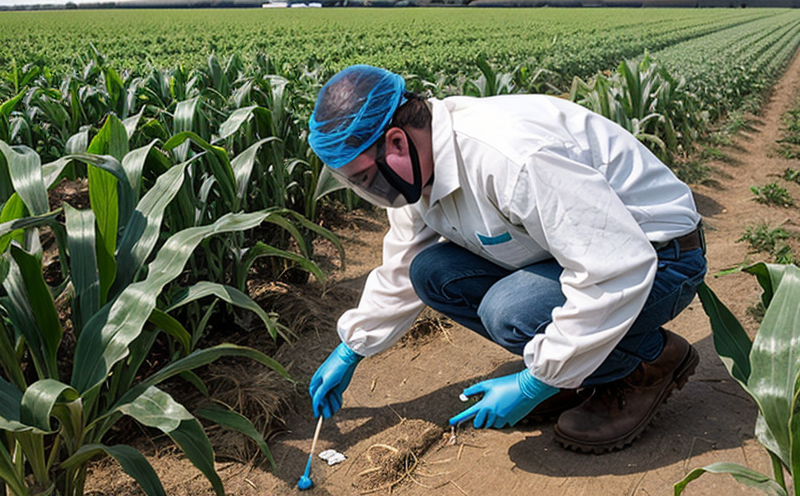Pendimethalin Residue Testing in Crops
In agriculture and forestry, ensuring the safety of crops is paramount. This includes monitoring the presence of pesticides like pendimethalin to ensure compliance with regulatory standards and consumer safety. Pendimethalin is a pre-emergence herbicide used primarily for controlling annual grasses and broadleaf weeds in various agricultural settings.
Pendimethalin residue testing ensures that crops are free from harmful pesticide residues, which can have adverse effects on human health if ingested through contaminated food products. The testing process involves several critical steps to ensure accuracy and reliability:
- Sample Collection: Proper collection of samples is crucial for accurate residue analysis. Samples are typically taken from representative areas within the field or storage facility, depending on the scope of the test.
- Preparation: The collected samples undergo thorough preparation to ensure that they are in a suitable state for testing. This may involve cleaning, drying, and grinding the samples to a consistent particle size.
- Analytical Methods: A range of analytical techniques can be employed for pendimethalin residue analysis, including gas chromatography with mass spectrometry (GC-MS), liquid chromatography coupled with tandem mass spectrometry (LC-MS/MS), and enzyme-linked immunosorbent assays (ELISAs). Each method has its own advantages and limitations.
- Instrumentation: High-performance instruments are essential for precise residue quantification. Modern equipment provides high sensitivity, enabling accurate detection of even trace amounts of pendimethalin residues.
The results obtained from these tests are crucial for decision-making processes within the agriculture sector. They help ensure that crops meet safety standards and comply with international regulations such as those outlined in ISO and ASTM guidelines.
Compliance is not just about avoiding penalties; it’s also about maintaining consumer trust. By adhering to strict residue limits, farmers and processors can enhance their reputation and marketability. Furthermore, accurate testing helps prevent potential recalls or legal actions that could impact business operations.
Applied Standards
The International Organization for Standardization (ISO) and the American Society for Testing and Materials (ASTM) have established standards relevant to pesticide residue testing, including those specific to pendimethalin. These include:
- ISO 17025: This standard ensures that laboratories meet the requirements for competence in complex testing and calibration activities.
- ASTM E1412-19: This practice provides guidelines for the collection, preparation, and analysis of soil samples containing pesticides.
These standards provide a framework that ensures consistent and accurate results across different testing environments. Compliance with these standards is essential for maintaining credibility within the agricultural sector and meeting regulatory requirements.
Quality and Reliability Assurance
The reliability of pesticide residue tests, including pendimethalin, hinges on rigorous quality control measures. Our laboratory adheres to strict protocols to ensure that all test results are accurate and reliable:
- Calibration: Instruments used in the testing process are regularly calibrated using certified reference materials.
- Validation: Each analytical method is validated against known standards before being implemented in routine tests. This ensures that results are consistent and reproducible.
- Training: Laboratory personnel undergo continuous training to stay updated on the latest techniques and methodologies.
- Audits: Regular internal audits are conducted to identify potential areas for improvement in our testing processes.
The combination of these measures ensures that every test result we produce is reliable, ensuring stakeholders can trust the data provided. This commitment to quality also helps build long-term relationships with clients who rely on us for accurate and timely information.
Use Cases and Application Examples
Pendimethalin residue testing plays a vital role in various aspects of the agricultural industry:
- Farm Management: Farmers can use test results to determine if pendimethalin residues are within acceptable limits, guiding future crop management practices.
- Processing Facilities: Testing helps ensure that processed products meet safety and quality standards before they reach the market.
- Safety Checks: Regulatory bodies may require testing to verify compliance with national or international regulations on pesticide residues in food products.
In addition, research organizations often use this data for developing new crop varieties resistant to pendimethalin, helping to improve agricultural efficiency and sustainability. By staying at the forefront of technology and methodology, our laboratory supports these critical applications through accurate testing services.





